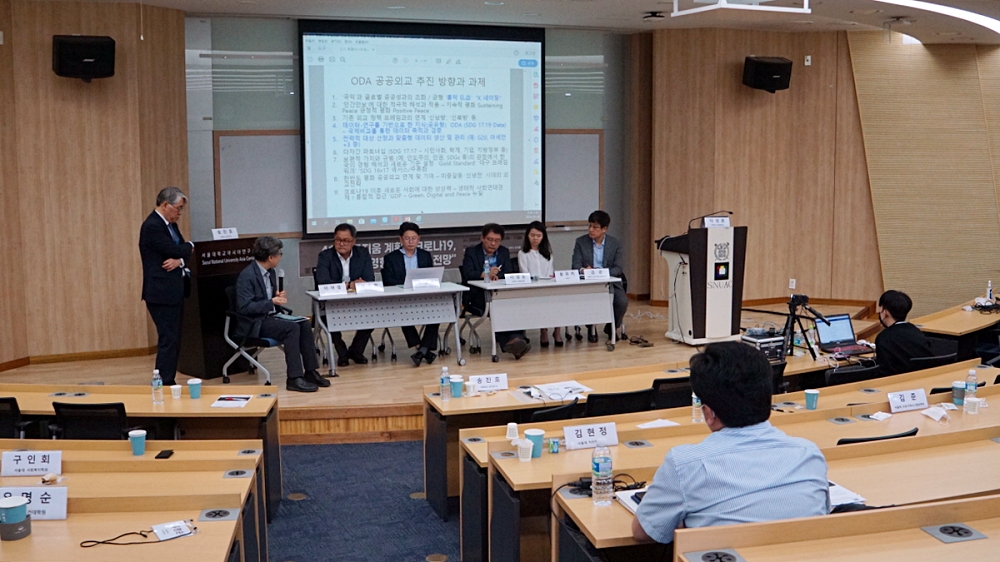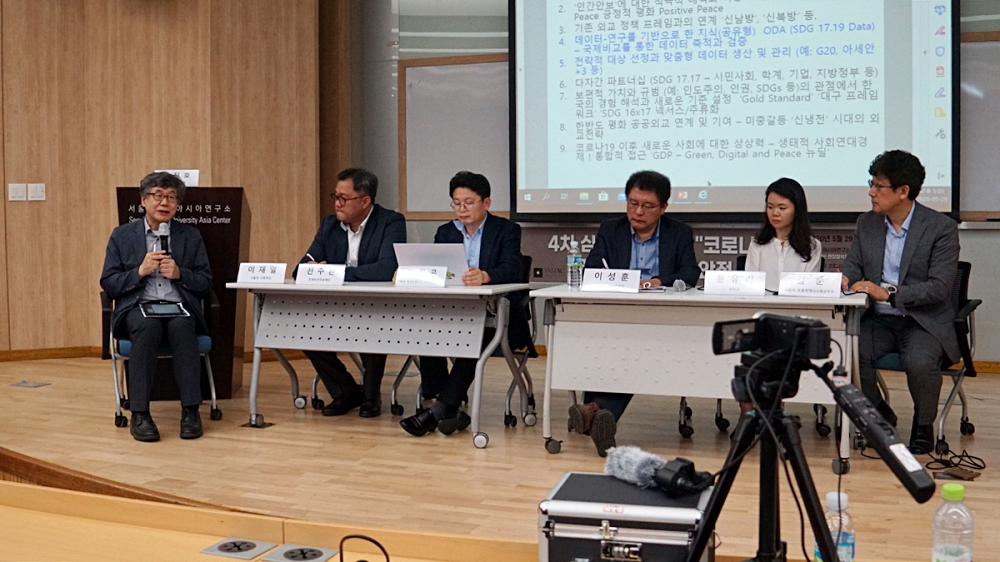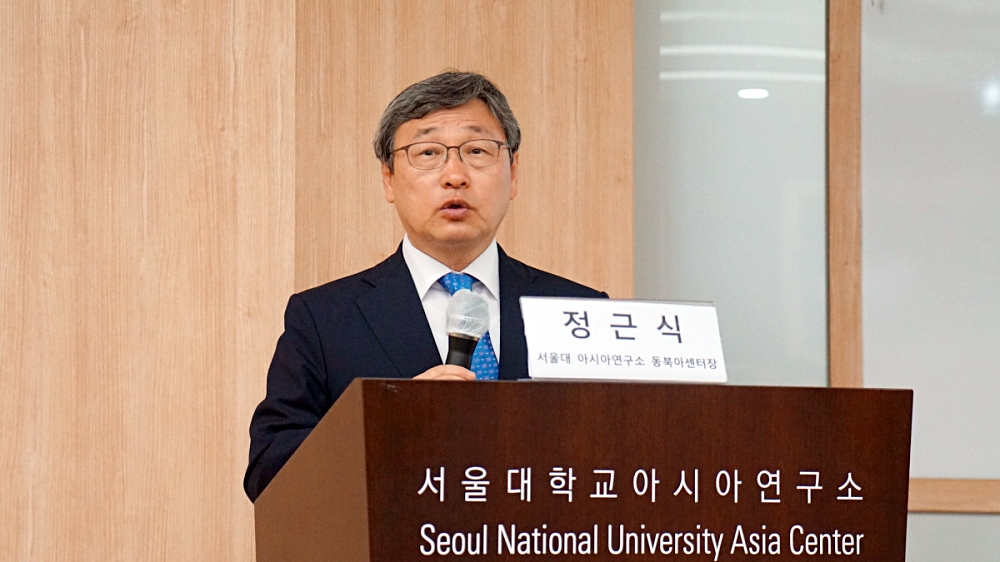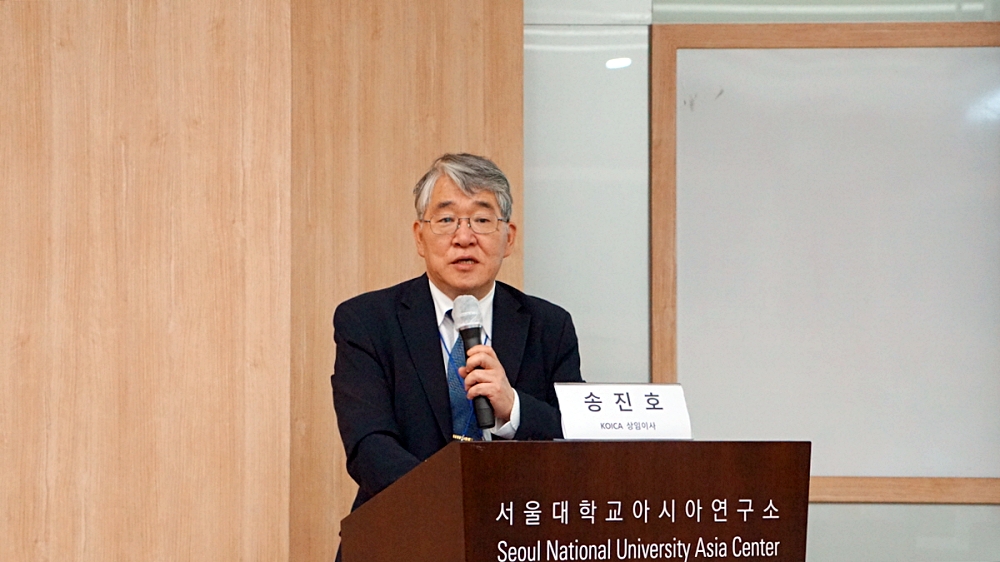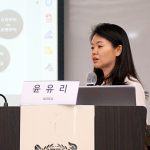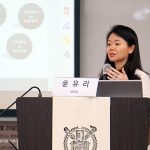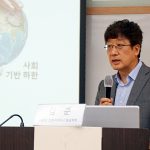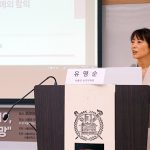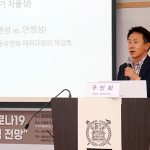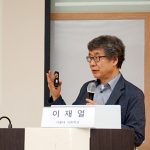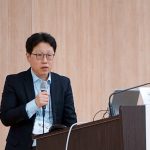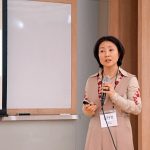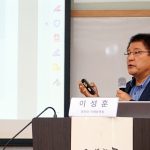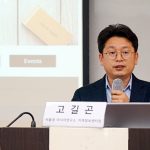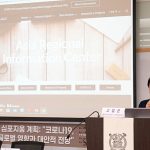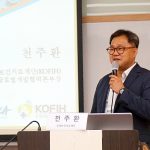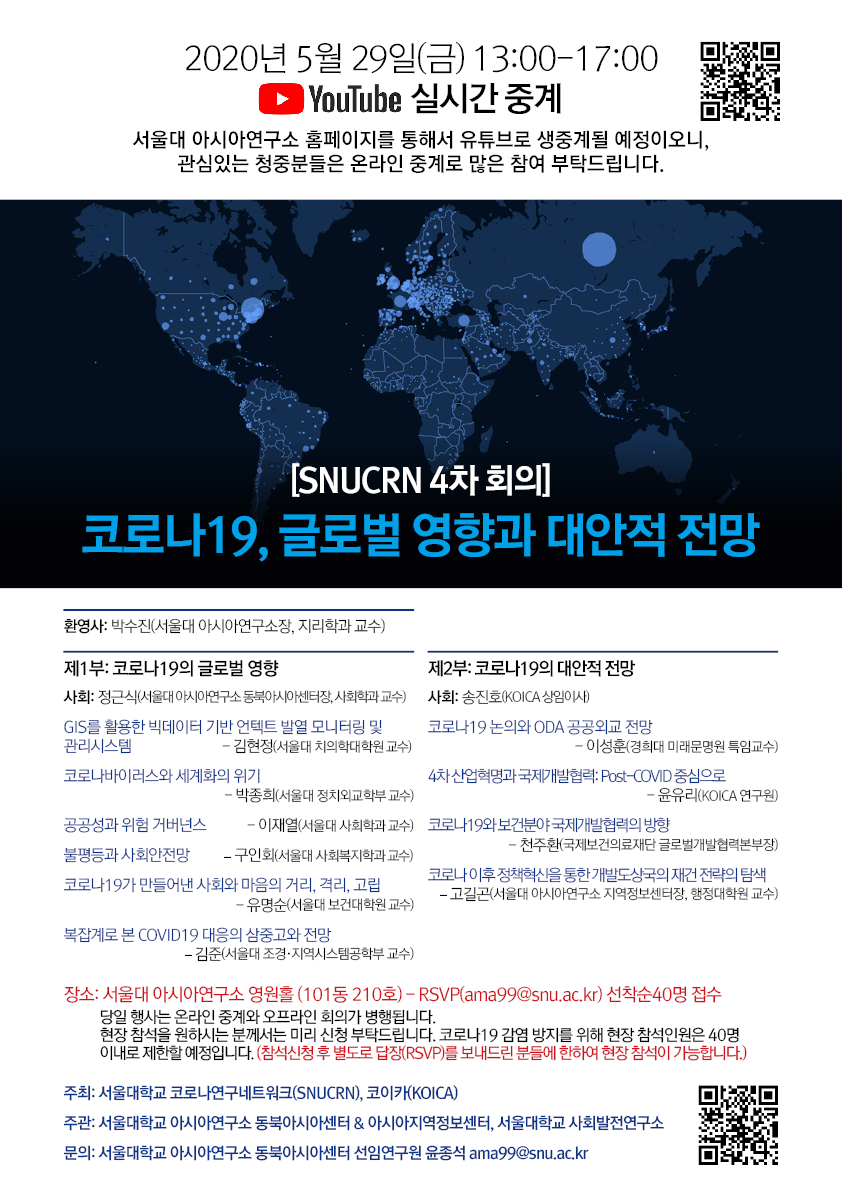
COVID-19, Global Impact and Alternative Prospects
- Date: May 29th, Friday, 2020 13:00-17:00
- Location: Youngone Hall, SNUAC (Bldg. 101)
COVID-19, Global Impact and Alternative Prospects
SNUAC has been holding conferences regarding COVID-19, starting with the urgent round-table talk last February and continuing with KOICA’s sponsorship, “The Formation and Prospect of Disaster Governance in the Era of COVID-19: International and Comparative Perspectives” (April) and “COVID-19, Collective Infection and Asia & Africa’s Responses” (May). The upcoming conference, “COVID-19, Global Impact and Alternative Prospects”, will take the accomplishment of three previous conferences as the basis, evaluate the global influence of COVID-19 in session 1, and discuss alternative visions in session 2, and thus seek to derive the strategies and direction of Korea after COVID-19.
- Hosted by SNU COVID-19 Research Network (SNUCRN), KOICA
- Organized by SNUAC Northeast Asia Center & Asia Regional Information Center, SNU Institute for Social Development and Policy Research
- Inquiry: Jongseok Yoon (Research Fellow, SNUAC Northeast Asia Center), ama99@snu.ac.kr
This event will consist of both online live streaming and offline conference. Those who wish to attend the conference on-site should register beforehand by email (ama99@snu.ac.kr). To prevent the spreading of COVID-19, the number of offline participants will be limited to 40, and only those who have received their RSVP responses will be eligible for entering.- This event will be available to watch on YouTube via SNUAC website. We ask those interested to participate online.
<Program>
– Registration and Welcome Speech / 13:00~13:20
Welcome speech: SooJin Park (Director, SNUAC; Dept. of Geography)
– Session 1: The Global Impact of COVID-19 / 13:20~15:10
Moderator: Keun-Sik Jung (Director, SNUAC Northeast Asia Center; Dept. of Sociology)
1. Hyun-Jeong Kim (Prof., School of Dentistry): Untact Fever Monitoring and Maintenance System Based on Big Data Using GIS
2. Jong Hee Park (Prof., Dept. of Political Science and International Relations): COVID-19 and the Crisis of Globalization
3. Jaeyeol Yee (Prof., Dept. of Sociology): Commonality and Risk Governance
4. Inhoe Ku (Prof., Dept. of Social Welfare): Inequality and Social Safety Nets
5. Myoungsoon You (Prof., Graduate School of Public Health): Social and Psychological Distance, Quarantine and Isolation Caused by COVID-19
6. Joon Kim (Prof., College of Agricultural and Life Sciences): The Triple Distress and Prospects of Responses to COVID-19 Through the Lens of Complex Networks
Break / 15:10~15:20
– Session 2: The Alternative Prospects of COVID-19 / 15:20~17:00
Moderator: Jinho Song (Director, KOICA)
1. Anselmo Lee (Prof., Kyung Hee Univ.): Discussion of COVID-19 and Prospects on ODA Public Diplomacy
2. Yuri Yoon (Researcher, KOICA): The 4th Industrial Revolution and International Development Cooperation: Focusing on Post-COVID
3. Joo Hwan Cheon (Director General, KOFIH): COVID-19 and the Direction of International Development Cooperation in Public Health
4. Kilkon Ko (Director, SNUAC Asia Regional Information Center; Graduate School of Public Health): Exploration of Developing Countries’ Rebuilding Strategies Through Policy Innovation After COVID-19
SNUAC Northeast Asia Center held an online academic conference on “COVID-19, Global Impact and Alternative Prospects” jointly with Asia Regional Information Center and SNU Institute for Social Development and Policy Research. This is the fourth academic event held by SNUAC regarding COVID-19, hosted by SNUCRN and sponsored by KOICA.
Starting with the urgent table talk on COVID-19 in February, SNUAC has held academic conferences on ‘The Formation and Prospect of Disaster Governance in the Era of COVID-19: International and Comparative Perspectives’ (April) and ‘COVID-19, Collective Infection and Asia & Africa’s Responses’ (May) jointly with KOICA. With comprehensive diagnoses on the global impacts of COVID-19 in diverse aspects such as public health, politics, society, and economy in the first session and an in-depth discussion of alternative prospects in the second session, this event was planned as an opportunity for all to derive post-COVID-19 strategies and directions for Korea based on the achievements from the past three academic conferences.
In his welcome speech, director SooJin Park of SNUAC retraced the achievements made by the four academic conferences in total and expressed his appreciation for joint hosts KOICA and SNU Institute for Social Development and Policy Research, experts who have presented and discussed on the topics related to COVID-19, and those who have joined the audience. He expected this fourth conference to be a place for seeking Korea’s role and prospects and creating future directions to pursue.
Session 1 was moderated by Prof. Keun-Sik Jung (Director, SNUAC Northeast Asia Center; Dept. of Sociology) and examined the global impact of COVID-19 from aspects of data, public health, welfare, global order, and complex systems to discuss future prospects and strategies for responding. Prof. Hyun-Jeong Kim (School of Dentistry) talked about the importance of untact fever monitoring and suggested policy and institutional alternatives for monitoring. Prof. Jong Hee Park (Dept. of Political Science and International Relations) raised the question of whether the social ‘halt’ caused by COVID-19 is a pause or the sign of a major transformation, diagnosed the second crisis of globalization and the reconstruction of world order, and presented the directions and alternatives for diplomacy in Korea. Prof. Jaeyeol Yee (Dept. of Sociology) suggested the need in the ‘valley of transition’ to embody the system fast through the expansion of the organization, emphasized the importance of commonality and learning experience, and presented tasks in terms of the policy, institution, and society for constructing risk governance. Prof. Inhoe Ku (Dept. of Social Welfare) analyzed the changes in Korean society in the past 30 years upon the global changes in the post-COVID-19 situation and raised the questions of the pandemic’s impact and social security. He evaluated various measures for social protection amidst a pandemic and presented major tasks for policy by examining employment and income safety nets. Prof. Myoungsoon You (Graduate School of Public Health) explained the social and psychological distance caused by elongated COVID-19 crisis based on the results of five serial national surveys on the awareness of COVID-19. She presented major tasks such as strengthening lateral trust, protecting mental health, supporting groups with damage to daily lives and enhancing the level of scientific communication as the pandemic crisis becomes longer. Prof. Joon Kim (College of Agricultural and Life Sciences) diagnosed the impact of COVID-19 in terms of the triple distress such as the upper limit of the ecological system in the complex network where all members interact, the lower limit of the social systemic basis, and the thermodynamic destiny of earth and universe system, and presented the prospects and tasks for sustainable development after COVID-19.
Session 2 was moderated by Jinho Song (Director, KOICA) and continued the panel presentations and discussions on the alternative prospects of COVID-19. Yuri Yoon (Researcher, KOICA) predicted a turn toward untact society and the acceleration of the 4th Industrial Revolution, and presented strategies and policy tasks for 4IR and international development cooperation. She also stressed the necessity of specifically discussing business development using 4IR’s innovative technology and the technical transfer to developing countries. Joo Hwan Cheon (Director General, KOFIH) emphasized inclusive support in post-COVID health and medical ODA by associating with existing ODA projects and joint responses by domestic and foreign institutions through connection and cooperation and presented detailed directions for urgent COVID-19 relief, all-time support for strengthening the capacities for responding to pandemics, and system-building for a global response. Prof. Kilkon Ko (Director, SNUAC Asia Regional Information Center; Graduate School of Public Health) comprehensively examined the situations that showed many differences from existing commonsensical knowledge, before pursuing the strategies for a post-COVID era. He suggested that future measures must be taken not in the commonsensical approach but in an open form and through international cooperation and that we need a social stabilization strategy in this political-economical instability. He especially emphasized that we must build a knowledge map including the information derived from sites of developing countries, process and synthesize the data and find implications therein and that we must give efforts in creating a new world that we have never experienced before. Prof. Anselmo Lee (Kyung Hee Univ.) summed up the achievements of the four academic conferences and stressed the need to respond to COVID-19 in the frame of existing SDGs, instead of simply responding to it as a virus. Also, he emphasized the responses by organizations related to human rights and civil society in terms of local and global governance and partnership, suggesting the direction for an international response and public diplomacy for international development cooperation.
A comprehensive discussion followed presentations in session 2. Participants agreed on the necessity of a systematic knowledge map or knowledge bank that can accumulate and verify the data from the field and the necessity of an alternative imagination and emphasized the need for exchanges and cooperation in data accumulation, expansion of global cooperation and trust beyond borders and active global solidarity and cooperation.
Through the closing remark, Prof. Jung noted the possibility of a struggle between going back to the normal or making the new normal after COVID-19. He highlighted the necessity for a new paradigm which can be made together through multi-organizational and global cooperation. The event was concluded with the final avowal of each organization and research institute to continue cooperation and efforts.


